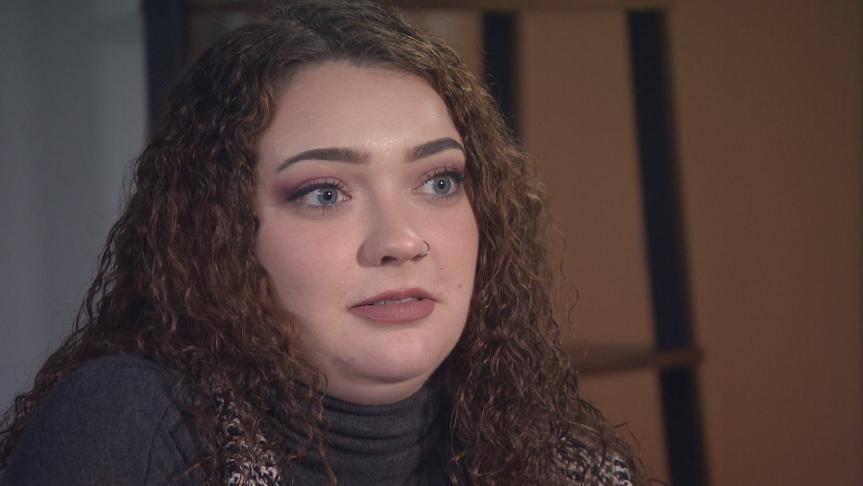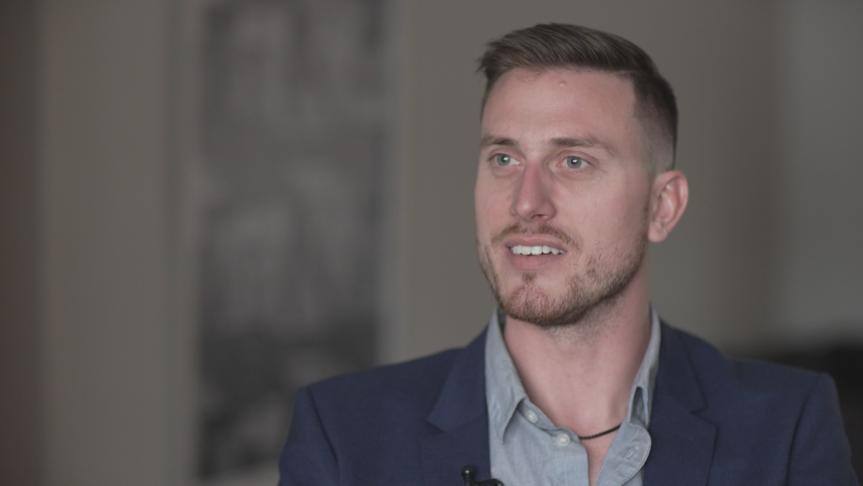Canadian DNA lab knew its paternity tests identified the wrong dads, but it kept selling them
Testing by Viaguard Accu-Metrics seemed to use guesswork over science, some ex-employees say
Jorge Barrera, Rachel Houlihan · CBC News · Posted: Apr 09, 2024 4:00 AM EDT | Last Updated: 43 minutes agoCorale Mayer of North Bay, Ont., holds her daughter, Harlow. Mayer said she trusted a Canadian DNA laboratory that produced wrong prenatal paternity test results. (Submitted by Corale Mayer)
Social Sharing
A Canadian DNA laboratory knowingly delivered prenatal paternity test results that routinely identified the wrong biological fathers — ruling out the real dads — and left a trail of shattered lives around the globe, a CBC News investigation has found.Harvey Tenenbaum, the owner of Viaguard Accu-Metrics, told a CBC producer with a hidden camera during a conversation in his office that prenatal paternity test results that his laboratory produced for about a decade were "never that accurate."
The hidden camera conversation unfolded in the midst of a months-long CBC News investigation into a years-long pattern of erroneous results produced by Viaguard's non-invasive prenatal paternity testing. The test — if done correctly — matches DNA from a fetus that is in a mother's blood with the biological father's DNA.
Viaguard, based in Toronto, sold its prenatal tests through various related online storefronts with names like Prenatal Paternities Inc. and Paternity Depot.
"The test was not that accurate…. And we're leery of that test now," said Tenenbaum.
Tenenbaum is 91 and still runs the laboratory, showing up onsite most days, answering phones and meeting with customers.
WATCH | Viaguard customers swap stories of conflicting paternity tests:

Conflicting paternity results from Viaguard anger customer
2 days agoDuration0:59
After North Bay resident Corale Mayer received conflicting prenatal paternity tests from Viagaurd, she found others with similar stories.
A longtime businessman, it seems he began selling DNA services through Viaguard in the early 2000s, registering a prenatal paternity division in 2013, according to business records.
During the hidden camera encounter, he presented himself as a seasoned scientific expert who's seen it all, and, in a matter-of-fact tone, said he knows mistaken prenatal paternity results could inflict lasting damage on lives.
"There's a lot involved if it gets screwed up," Tenenbaum told the CBC News producer, who posed as a prospective customer seeking a paternity test.
"What if it's the wrong guy named and you're aborting your child of, you know, a wrong person…. We can imagine everything happens in life…. You see them all, and worse, and worse."
He also described instances where Viaguard's tests were proven wrong during a birth.
"That has happened. Test the white guy and the baby came out Black, and the white guy's saying: 'What's going on here?'" said Tenenbaum.

Harvey Tenenbaum, the owner of Viaguard Accu-Metrics, told a CBC producer with a hidden camera that prenatal paternity test results that his laboratory produced for about a decade were 'never that accurate.' (Ousama Farag/CBC News)
When CBC News later directly approached Tenenbaum, he reversed himself, saying the tests were "accurate" and "perfect." He said he stopped selling them over rising overhead costs.
CBC News interviewed dozens of people whose lives were impacted by Viaguard's wrong prenatal paternity test results. Many former customers paid from $800 to slightly more than $1,000 for the laboratory's home test kits from 2014 to 2020.
The interviews included men and women in Montreal, North Bay, Ont., and Victoria. Other former customers interviewed were in Montana, Georgia, California, Guatemala, the U.K. and Australia.
In many cases, aftershocks still ripple, as a parent tries to make up for lost time or struggles to find the right way to reveal the truth about paternity.
"I really hate the name Viaguard," said Corale Mayer, 22, from North Bay, Ont.
WATCH | Faulty paternity test changed this Atlanta man's life:

Viaguard's test altered the trajectory of this Atlanta man's life
2 days agoDuration0:40
A Viaguard paternity test told Atlanta resident John Brennan he was going to be a father when he was 21. Another test would later prove he wasn't the dad.
Mayer received two wrong prenatal paternity test results — one identified the wrong biological father, the other ruled out the actual one — that altered the trajectory of her 2020 pregnancy.
It pushed her to try to involve a man who wanted nothing to do with her or her child, she said.
"It's extremely traumatic."
Mayer helped start a social media-based group with dozens of others who also said their lives were burned by Viaguard's wrong prenatal paternity results.
"When I found out there were other people … it was a relief," she said. "Finally, I could talk to somebody, and they would be like, 'Yup, I get that.' It was nice to feel I am not insane."
'Get me my money'
Viaguard claimed to use a common prenatal paternity test commercially available to the public since about 2014.Experts say it is highly accurate, if conducted properly.
A non-invasive prenatal paternity test, it matches thousands of genomic data points — known as single nucleotide polymorphisms (SNPs) — in the fetal DNA, which flows in the mother's blood, with thousands of SNPs in the father's DNA.
However, Tenenbaum seemed to rely more on guesswork than science when handling at least some prenatal paternity tests, former employees alleged in interviews with CBC News.
Sika Richot worked for nearly three months answering phones for Viaguard in 2019.
Richot said she was coached to ask women seeking prenatal paternity test kits about times in their menstrual cycles and the dates they had intercourse with different men — information that is useless for a DNA test.
Sika Richot worked for nearly three months answering phones for Viaguard in 2019. Richot said she was coached to ask women seeking prenatal paternity test kits about times in their menstrual cycles and the dates they had intercourse with different men. (Rachel Houlihan/CBC)
Staff put the dates into an online ovulation calendar to narrow down the possible biological father, she said. Richot then entered the information into a form that went to Tenenbaum for signoff.
"[Tenenbaum] would always make a comment like: 'It's definitely this one [the biological father]. It's this one, it's got to be this one,'" said Richot.
Samantha Friday, who also answered phones, worked there for slightly more than a year. She said Tenenbaum micromanaged all laboratory operations.
- CBC INVESTIGATES
How this chihuahua's DNA helped expose a suspected tax scam involving fake Indian status cards - Lab in dog DNA debacle used phoney Facebook identity to recruit Sixties Scoop, Motherisk plaintiffs
"It sounds horrible to say, but it was kind of like … get me my money. That was it. Just kind of get me my money," said Friday.
"I think anyone who has had their DNA done for whatever purposes in the Toronto lab should probably consider redoing them."
Richot and Friday did not handle any samples or conduct any laboratory work while working at Viaguard.







